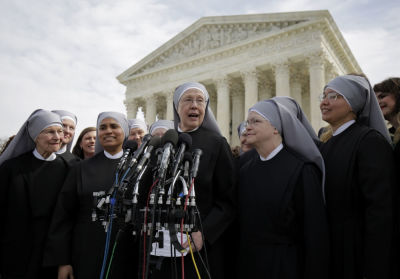
After 14 years and two Supreme Court victories, the Little Sisters of the Poor are still in court, resisting an attempt by states to force the organization’s health insurance to cover contraceptive services, including abortifacient methods, despite its religious objection. Despite previous rulings in their favor, on Wednesday a federal judge in Pennsylvania ruled against the Catholic charity by throwing out a 2018 federal rule designed to protect them.
In her 57-page ruling, Chief Judge Wendy Beetlestone of the Eastern District of Pennsylvania essentially found the religious exemption rule adopted during the first Trump administration invalid because it protected religious freedom too much. Because the Trump administration did more than the bare minimum to preserve religious freedom, Beetlestone threw out the entire rule as “arbitrary and capricious.”
Beetlestone pleaded that “there were options other than the Religious Rule open to the Agencies,” and “the Religious Rule goes far ‘beyond what the Departments’ justification … supported.’” Beetlestone insisted that the Trump administration might have offered only a fig-leaf religious accommodation to most objectors, while reserving full exemptions for only the most extensive religious objections. Instead of this complex and miserly scheme, the Trump administration made exemptions available to anyone with a religious objection. This liberal interpretation was not absolutely required by existing federal law, she argued, so therefore it was “arbitrary and capricious.”
But a broad interpretation of religious liberty is necessary because some states and federal agencies take every opportunity to infringe upon it. No case demonstrates this sad reality better than that of the Little Sisters of the Poor.
The persecution of the Little Sisters began all the way back in 2011, when a Democratic supermajority rammed through Obamacare, a health care overhaul so heavy-handed it was a primary impetus of the Tea Party movement. One provision in that mammoth legislation required all health insurance plans to cover women’s health care, which the Obama administration subsequently interpreted to include all varieties of contraceptives.
Left-leaning state governments gleefully attempted to foist this requirement upon the Little Sisters and other religious organizations, which had not previously covered contraception — not to mention for-profit Christian employers like Hobby Lobby, which won its own Supreme Court case in 2014. When the Supreme Court finally addressed the Little Sisters’ case in Zubik v. Burwell (2016), they consolidated cases from no fewer than seven jurisdictions.
Consider for a moment the irony of forcing a group of nuns to pay for contraceptive coverage. Not only did their Catholic beliefs condemn contraception per se, their personal commitments to this faith led them to take vows of chastity that render such treatments quite irrelevant. In other words, there was never any real danger that the Little Sisters’ refusal to cover contraceptives for their employees would result in any woman wanting contraceptives and not being able to obtain them. That is, there were never any plausible victims. The only reason for any state to force the Little Sisters to cover contraceptives was ideological animosity toward — indeed, outright intolerance of — their religious beliefs.
During the Obama administration, government entities tried to argue that there should be no religious exceptions to Obamacare at all. In 2016, the Supreme Court unanimously ruled that religious freedom protections, like the Religious Freedom Restoration Act, had to apply, and they kicked the cases back to lower courts to analyze the matter correctly.
In 2017, the Trump administration apologized for the religious persecution of its predecessor and announced its intention to adopt rulemaking that would protect the religious freedom of the Little Sisters and other similar groups. But, when it finally adopted that rule in 2018, the same left-leaning states sued, arguing that the rule was procedurally invalid. The Little Sisters intervened in a challenge from Pennsylvania and New Jersey in the 3rd Circuit.
In 2020, the Supreme Court decided (7-2) in Little Sisters of the Poor v. Pennsylvania that the Trump administration had authority to promulgate the rule, and that the rule was procedurally valid. Five justices still on the bench joined the majority opinion in that case, while Justices Elena Kagan and Stephen Breyer (who has since retired) concurred in the outcome but not the reasoning. The court once again kicked the case down to lower courts “for further proceedings consistent with this opinion.”
(The case was put on ice for four years during the Biden administration, while the Biden administration schemed at how to undo Trump’s rule; it was ultimately unsuccessful.)
Inexplicably, Judge Beetlestone considered the Supreme Court’s reasoning and then invalidated the rule on entirely different grounds, which had not been at issue before. In so doing, she unwisely relied primarily on the concurring opinion of Justice Kagan, not the controlling precedent set by the court. She also relied on what was only a Third Circuit precedent in reasoning her way to invalidating federal rules across the entire nation. And, despite an explicit severance clause, she refused to vacate only the offending portions of the rules, vacating them in their entirety.
“The district court blessed an out-of-control effort by Pennsylvania and New Jersey to attack the Little Sisters and religious liberty,” responded Becket Fund President Mark Rienzi, who is the lead attorney for the Little Sisters. “It’s bad enough that the district court issued a nationwide ruling invalidating federal religious conscience rules. But even worse is that the district court simply ducked the glaring constitutional issues in this case, after waiting five years and not even holding a hearing. It is absurd to think the Little Sisters might need yet another trip to the Supreme Court to end what has now been more than a dozen years of litigation over the same issue.”
Originally published at The Washington Stand.
Joshua Arnold is a senior writer at The Washington Stand, contributing both news and commentary from a biblical worldview.


